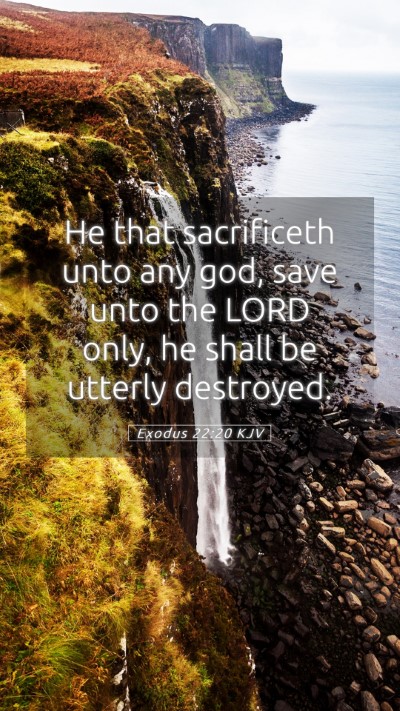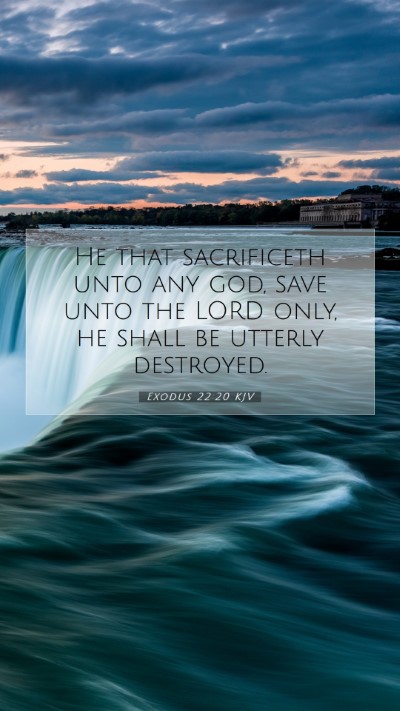Bible Verse Meaning: Exodus 22:20
Verse: "He who sacrifices to any god, other than the LORD alone, shall be utterly destroyed." (Exodus 22:20, ESV)
Understanding Exodus 22:20
This verse addresses the serious issue of idolatry and the worship of gods other than the God of Israel. It highlights the absolute monotheism that is central to the faith and covenant relationship between God and His people.
Insights from Public Domain Commentaries
-
Matthew Henry's Commentary
Matthew Henry emphasizes the gravity of worshiping other gods and notes that God's prohibitions against idolatry are not mere suggestions but commands that come with severe consequences. The destruction mentioned is not just physical but signifies the spiritual separation from God that comes with idolatry.
-
Albert Barnes' Commentary
Albert Barnes expounds on the historical context of this command, asserting that it served to insulate the Israelites from the pagan practices of surrounding nations. Barnes also points out that the Israelites were chosen to be different and were to uphold the integrity of worship due to their covenant relationship with God.
-
Adam Clarke's Commentary
Adam Clarke provides a detailed analysis of the consequences of idolatry. He explains that sacrificing to other gods not only violates God's first commandment but also leads to societal decay. Clarke reinforces the notion that such actions would disqualify an individual from enjoying the blessings and protection that come from serving the one true God.
Key Themes
- The Exclusivity of Worship: The verse underscores that worship is due only to the Lord, consistent with the first commandment, which directly prohibits idolatry.
- Consequences of Idolatry: The phrase "shall be utterly destroyed" serves as a stern warning of the severe repercussions for turning away from God and embracing foreign deities.
- Context of the Covenant: This command is situated within the broader covenant framework God established with Israel, serving to guide them in their relationship and devotion to Him.
Application of the Verse
To apply this verse to our lives today, it encourages believers to reflect on what they place their trust and worship in. It challenges individuals to evaluate their priorities, ensuring that no worldly pursuits or interests overshadow their dedication to God. By understanding Scripture in this context, believers can better appreciate the significance of exclusive devotion to God alone.
Related Bible Cross References
- Exodus 20:3: "You shall have no other gods before me." (The foundation of monotheism)
- Deuteronomy 5:7: "You shall have no other gods before me." (Reiterating the commandment)
- 1 Corinthians 10:20-21: "I imply that what pagans sacrifice they offer to demons and not to God." (The New Testament perspective on idolatry)
Conclusion
Exodus 22:20 serves as a solemn reminder for today’s believers about the importance of fidelity to God. This understanding can enrich Bible study groups and online discussions regarding the role of idolatry in contemporary life. As you delve into this scripture, consider the implications it has on your faith journey, and utilize various Bible study tools and resources to enhance your learning.
Further Reading and Exploration
For those seeking more profound insights into Bible verse meanings, interpretations, and applications, consider engaging with Bible study guides that discuss the historical context of passages, the significance of various teachings, and how to interpret difficult Bible passages within a modern framework.


